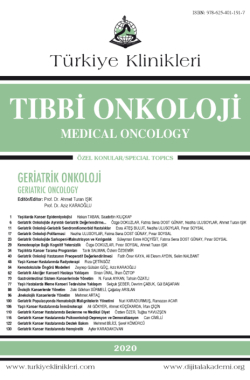Management of Hematological Malignities in Geriatric Population
Nuri KARADURMUŞa, Ramazan ACARa
aSağlık Bilimleri Üniversitesi Gülhane Tıp Fakültesi, Tıbbi Onkoloji BD, Ankara, TÜRKİYE
Karadurmuş N, Acar R. Geriatrik populasyonda hematolojik malignitelerin yönetimi. Işık AT, Karaoğlu A, editörler. Geriatrik Onkoloji. 1. Baskı. Ankara: Türkiye Klinikleri; 2020. p.100-5.
ABSTRACT
Although there are important differences in the treatment of advanced cancer in the elderly population, the same principles used in younger patients can be applied if appropriate precautions are taken into account. Pharmacokinetic differences in chemotherapy drug handling in the elderly potentially can contribute to increased toxicity. Extent of comorbidity and functional impairment should be assessed prior to the initiation of treatment and should be incorporated into the overall treatment plan. For the healthy elderly patient with minimal comorbidity and near-normal functional reserve, aggressive treatment including full doses of chemotherapy is warranted, especially in the potentially curative setting, and can yield results that are similar to those in younger patients. For the frail elderly patient, therapeutic goals may need to focus primarily on quality of life and symptom palliation, rather than prolonging survival.
Keywords: Hematological malignancy; lymphoma; geriatric oncology
Kaynak Göster
Referanslar
- Yancık, Rosemary; RIES, Lynn AG. Cancer in older persons: an international issue in an aging world. In: Seminars in oncology. WB Saunders; 2004. p.128-36. [Crossref] [PubMed]
- Yee, K. W., Pater, J. L., Pho, L., Zee, B., & Siu, L. L. Enrollment of older patients in cancer treatment trials in Canada: why is age a barrier?. Journal of Clinical Oncology.2003;21(8):1618-23. [Crossref] [PubMed]
- Kumar, A., Soares, H. P., Balducci, L., & Djulbegovic, B. Treatment tolerance and efficacy in geriatric Oncology: a systematic review of phase III randomized trials conducted by five National Cancer Institute-sponsored cooperative groups. Journal of Clinical Oncology. 2007;25(10):1272-6. [Crossref] [PubMed]
- Sawhney, R., Sehl, M., & Naeim, A. Physiologic aspects of aging: impact on cancer management and decision making, part I. The Cancer Journal. 2005;11(6):449-60. [Crossref] [PubMed]
- Sehl, M., Sawhney, R., & Naeim, A. Physiologic aspects of aging: impact on cancer management and decision making, part II. The Cancer Journal. 2005;11(6):461-73. [Crossref] [PubMed]
- Kim, T. N, Yang, S. J, Yoo, H. J, Lim, K. I., Kang, H. J., Song, W.,et al. Prevalence of sarcopenia and sarcopenic obesity in Korean adults: the Korean sarcopenic obesity study. International journal of Obesity.2009;33(8): 885. [Crossref] [PubMed]
- Yancik, R., & Ries, L. A. Cancer in older persons. Magnitude of the problem‐how do we apply what we know?. Cancer. 1994;74(S7),:1995-2003. [Crossref] [PubMed]
- Yancik, R., Wesley, M. N., Ries, L. A., Havlik, R. J., Long, S., Edwards, B. K., & et al. Comorbidity and age as predictors of risk for early mortality of male and female colon carcinoma patients: a population‐based study. Cancer: Interdisciplinary International Journal of the American Cancer Society. 1998;82(11):2123-34. [Crossref]
- Yellen, S. B., Cella, D. F., & Leslie, W. T. Age and clinical decision making in oncology patients. JNCI: Journal of the National Cancer Institute. 1994;86(23):1766-70. [Crossref] [PubMed]
- Schrijvers, D., Highley, M., De, E. B., Van, A. O., & Vermorken, J. B. Role of red blood cells in pharmacokinetics of chemotherapeutic agents. Anti-cancer Drugs.1999;10(2):147-53. [Crossref] [PubMed]
- Partridge, A. H., Avorn, J., Wang, P. S., & Winer, E. P. Adherence to therapy with oral antineoplastic agents. Journal of the national cancer institute.2020;94(9):652-61. [Crossref] [PubMed]
- Mohile, S. G., Dale, W., Somerfield, M. R., Schonberg, M. A., Boyd, C. M., Burhenn, P. et al. Practical assessment and management of vulnerabilities in older patients receiving chemotherapy: American Society of Clinical Oncology Guideline for Geriatric Oncology. Journal of clinical oncology: official journal of the American Society of Clinical Oncology. 2018; 36(22):2326. [Crossref] [PubMed] [PMC]
- Baraldi-Junkins, C. A., Beck, A. C., & Rothstein, G. Hematopoiesis and cytokines: relevance to cancer and aging. Hematology/ oncology clinics of North America. 2000;14(1):45-61. [Crossref] [PubMed]
- Smith, T. J., Khatcheressian, J., Lyman, G. H., Ozer, H., Armitage, J. O., Balducci, L.,et al. 2006 update of recommendations for the use of white blood cell growth factors: an evidence-based clinical practice guideline. J Clin Oncol. 2006; 24(19):3187-205. [Crossref] [PubMed]
- Hershman, D. L., Eisenberger, A., Wang, J., Jacobson, J., Grann, V., McBride, R., et al. Doxorubicin, cardiac risk factors and cardiac toxicity in elderly patients with diffuse b-cell non-Hodgkin's lymphoma. Journal of Clinical Oncology. 2007;25 (18_suppl): 9050-9050. [Crossref]
- Kivisto, K. T., Kroemer, H. K., & Eichelbaum, M. The role of human cytochrome P450 enzymes in the metabolism of anticancer agents: implications for drug interactions. British journal of clinical pharmacology. 1995;40(6):523- 30. [Crossref] [PubMed] [PMC]
- Chrischilles, E. A., Pendergast, J. F., Kahn, K. L., Wallace, R. B., Moga, D. C., Harrington, D. P., et al. Adverse events among the elderly receiving chemotherapy for advanced non- small-cell lung cancer. Journal of Clinical Oncology.2010; 28(4):620. [Crossref] [PubMed] [PMC]
- Rodin, M. B., & Mohile, S. G. A practical approach to geriatric assessment in oncology. Journal of Clinical Oncology. 2007;25(14): 1936-44. [Crossref] [PubMed]
- Extermann, M., & Hurria, A. Comprehensive geriatric assessment for older patients with cancer. Journal of Clinical Oncology. 2007;25(14):1824-31. [Crossref] [PubMed]
- Freyer, G., Geay, J. F., Touzet, S., Provencal, J., Weber, B., Jacquin, J. P.,et al. Comprehensive geriatric assessment predicts tolerance to chemotherapy and survival in elderly patients with advanced ovarian carcinoma: a GINECO study. Annals of Oncology. 2005;16(11):1795-800. [Crossref] [PubMed]
- Hurria, A., Mohile, S., Gajra, A., Klepin, H., Muss, H., Chapman, A.,et al. Validation of a prediction tool for chemotherapy toxicity in older adults with cancer. Journal of Clinical Oncology. 2016;34(20):2366. [Crossref] [PubMed] [PMC]
- Extermann, M., Boler, I., Reich, R. R., Lyman, G. H., Brown, R. H., DeFelice, J.,et al. Predicting the risk of chemotherapy toxicity in older patients: The Chemotherapy Risk Assessment Scale for High‐Age Patients (CRASH) score. Cancer. 2012;118(13):3377- 86. [Crossref] [PubMed]

